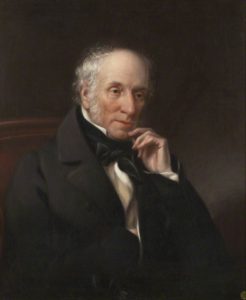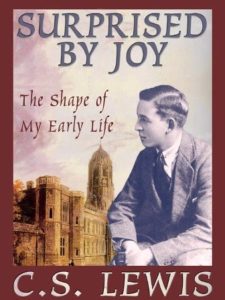 Prior to my recent England trip with students, the only time I can recall reading English poet William Wordsworth was in one of our sessions in preparation for the trip.
Prior to my recent England trip with students, the only time I can recall reading English poet William Wordsworth was in one of our sessions in preparation for the trip.
For today’s blog post, I was simply going to include Wordsworth as one of three authors whose homes we visited.
Then, just yesterday, as I was doing more research on him, I discovered a stronger connection with C. S. Lewis than I had imagined. I decided Wordsworth needed a post of his own, especially as I wanted to put a spotlight on that connection.
 For eight of Wordsworth’s most productive years, he lived in Dove Cottage in the picturesque village of Grasmere, located in the Lakes District, an area of England I’d never seen before.
For eight of Wordsworth’s most productive years, he lived in Dove Cottage in the picturesque village of Grasmere, located in the Lakes District, an area of England I’d never seen before.
Wordsworth’s poems, especially those from his early years, are quite focused on nature. In fact, for the first thirty-plus years of his life, one could say that nature was his religion. That’s why he’s considered one of the originators of Romantic poetry. The beauty of the Lakes District certainly can help engender such feelings. The back yard of his home is a garden with a hill from which one can see the nearby village and mountains.
I knew Lewis called himself a Romantic and that he had referenced Wordsworth occasionally, but until yesterday’s research, I didn’t know how strong that link was.
I don’t know how I missed it, but Lewis’s autobiography, Surprised by Joy, takes its title from a Wordsworth poem, “Surprised by Joy–Impatient as the Wind.” You can even find that quote on Lewis’s title page. Wordsworth’s poem is about memory and an intense longing for a love who was lost to death. Lewis’s memoir also focuses on that intense longing for joy that Wordsworth enunciated. Lewis even attempted, at first, to write his autobiography as a long poem in the Wordsworth style in his classic, The Prelude.
Romanticism was one of Lewis’s philosophical stops on his journey to Christianity. I also read that when he wrote The Pilgrim’s Regress, the fictional tale of his roundabout path to Christian faith, it not only took that form with John Bunyan’s Pilgrim’s Progress as a model, but also with Wordsworth’s The Prelude in mind.
 Lewis couldn’t stop at Romanticism; it didn’t fulfill that longing ultimately. He mentions Wordsworth in Surprised by Joy, and in chapter XI, “Check,” he describes how a walk he took (Wordsworth loved walks also) gave him a sense of tasting heaven, and how he longed to find that experience again. He realized, though, that he couldn’t replicate the exact experience, but that it wasn’t the experience itself that was the issue—instead it was the stab of joy that he could still remember.
Lewis couldn’t stop at Romanticism; it didn’t fulfill that longing ultimately. He mentions Wordsworth in Surprised by Joy, and in chapter XI, “Check,” he describes how a walk he took (Wordsworth loved walks also) gave him a sense of tasting heaven, and how he longed to find that experience again. He realized, though, that he couldn’t replicate the exact experience, but that it wasn’t the experience itself that was the issue—instead it was the stab of joy that he could still remember.
What Lewis eventually learned was that you cannot recapture that very moment; that would be idolatry. Then he said,
Wordsworth, I believe, made this mistake all his life. I am sure that all that sense of loss of vanished vision which fills The Prelude was itself vision of the same kind, if only he could have believed it.
Lewis says Wordsworth made this mistake all his life, but in my research I saw that he finally came to orthodox Christian faith and was known as a strong Anglican. I would need to research more to see how that influenced his later writings, but at least one source noted that he moderated his nature worship and brought it into submission to Christianity. I sincerely hope that is true.
The Wordsworth-Lewis link is most interesting. I’m glad I could add this to my ever-increasing boatload of knowledge about English literature.

